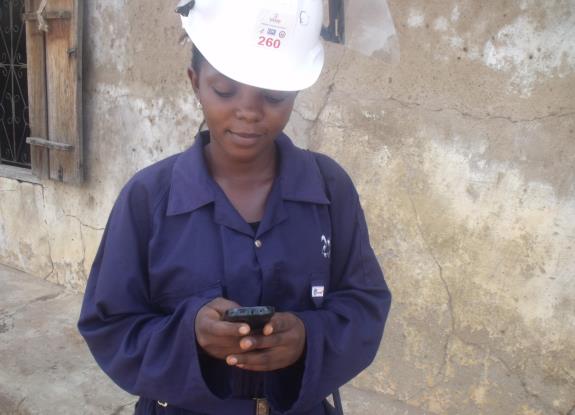AIRS enrolled all the spray personnel in a mass messaging platform and began using text messages to disseminate reminders, reinforce training, and motivate staff.

Elizabeth Onawo, a female team leader from Sabon Gari ward in Doma Local Government Area uses text message to communicate with the operations manager and spray operators.
In 2012, AIRS led IRS in Doma and Nassarawa Eggon Local Government Areas approximately 200 kilometers southeast of Abuja, which protected more than 346,000 people from malaria including 15,900 pregnant women and 62,500 children under five. AIRS reached 99% of targeted homes with the malaria intervention.
One of the biggest challenges of implementing an IRS campaign is supervision. During the 2013 IRS campaign in Doma and Nassarawa Eggon Local Government Areas, AIRS hired and trained more than 300 seasonal staff to do various jobs including spray homes, supervise spray teams, manage warehouses where insecticide is stored, collect data, and wash uniforms. Previously, the only way to communicate with all staff was essentially a phone tree. For example, if an operations manager noticed that some workers were not wearing the proper protective clothing he would have to call 50 team leaders who would then relay the message to their spray teams the following day during a meeting. It was not an efficient system. The AIRS Nigeria team decided to do something about it.
“We observed that all workers have mobile phones and saw the need to take advantage of that,” said Nduka Iwuchukwu, AIRS Nigeria operations manager.
AIRS enrolled all the spray personnel in a mass messaging platform and began using text messages to disseminate reminders, reinforce training, and motivate staff. In addition to all staff messages, AIRS segmented different workers by job title and sent them tailored messages to improve their performance. Workers found reminders helpful and informative.
“The SMS system is very good. We have been getting so much information through it. It saves time, encourages us, and reminds us of some of the things we were expected to do or not to do,” Elizabeth Onawo, team leader from Sabon Gari ward in Doma Local Government Area.
Over the course of the 33 day IRS campaign, AIRS disseminated approximately one to two messages per week. Iwuchukwu, the operations manager, said that when he discovered some workers were not demonstrating the proper spraying technique and using too much insecticide, he sent a mass text message to spray operators. This enabled him to correct workers’ behavior and ensure the proper amount of insecticide was applied to walls. During follow-up visits, supervisors confirmed that workers had adjusted their spray technique according to recommendations. Toward the end of the campaign, when workers were becoming fatigued, Iwuchukwu texted staff words of encouragement and recognition to help them finish strong.
“The text message program made supervision much easier. Once we identified a problem, we could immediately notify spray operators and make corrections. It has definitely improved our quality of work,” said Iwuchukwu.
Better quality of spraying means IRS is more effective at preventing malaria in Nigeria, where nearly the entire population is at risk. Malaria accounts for 60% of outpatient visits, 30% of hospitalizations among children under five, and 11% of maternal mortality in Nigeria.
This story was taken from www.africairs.net
